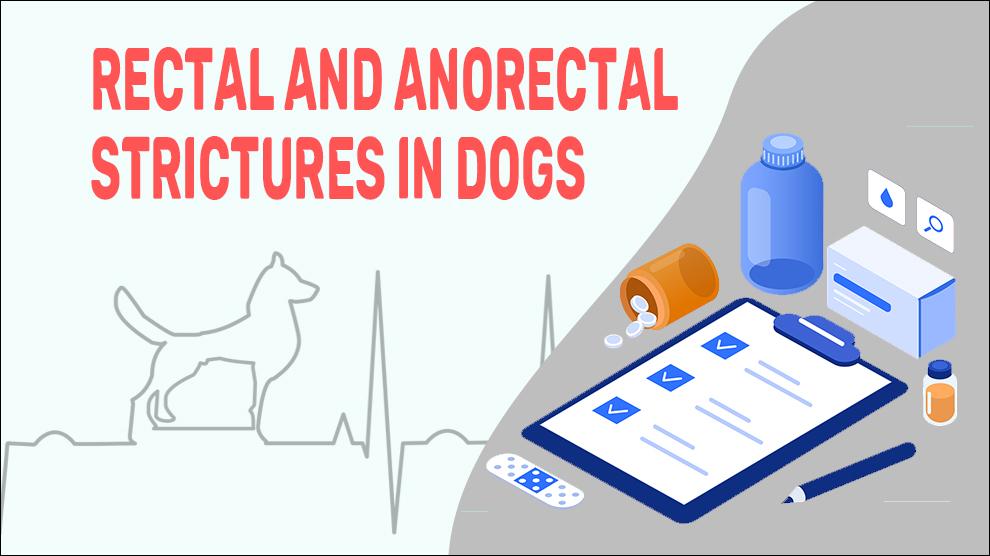When a blood vessel or tubular organ becomes distinctly constricted such that it can no longer perform its usual anatomical functions, it is a condition referred to as strictures.
Rectal and anorectal stricture is a narrowing of the rectum, which can either be congenital or acquired, typically attributable to chronic inflammation and ensuing scar formation.
The symptoms are similar to human's Perianal Crohn disease. There are a variety of etiologies that can lead to acquired anal stricture formation: due to any postoperative complications, inflammatory bowel disease (fibrosis leads to stricture), neoplasia, radiation therapy, tuberculosis, etc.
Treatments range from medication to surgery, though for many dogs the problem is unstable and for some, this is a progressive condition.
Symptoms Of Rectal And Anorectal Strictures
- Experiencing pain when defecating
- Difficult to expel stools and break apart like pellets
- Evidence of mucus, bright red blood in the stool (rectal bleeding)
- Skin irritation and redness around the anus
- Decreased appetite (anorexia)
- Constipation
- A smelly discharge
- Restless and Irritability
Treatment Options For Rectal And Anorectal Strictures
- Medical management can be classified into 2 phases- an induction phase and a maintenance phase.
- Medication managements are available but these approaches can be unsatisfactorily useful and frustrating for the pet owners and the pet.
- In milder cases, chemical cauterization (chemical agents destroy abnormal tissue), Cryotherapy (a freezing agent is used to freeze and destroy abnormal tissue), and Laser therapy are used.
- Surgery is only recommended for dogs when other treatments have failed.
- Almost 25% of cases are unresponsive and need intermittent treatment for life. The remaining 75% of cases resolve after lengthy treatment.
- But in all the cases, although not curative, the treatment is certainly palliative and reduces the pain and discomfort that the dog experiences.
- Anti-inflammatory and Immunosuppressive Therapy for IBD: prednisolone or prednisone, Cyclosporine, Chlorambucil, Budesonide, or Sulfasalazine.
- Antibiotics (metronidazole, tylosin, or oxytetracycline) are prescribed adjunctively to control complicating infections.
Home Remedies For Rectal And Anorectal Strictures
- Vitamin B12 Supplementation: IBD dogs are unable to absorb this important vitamin essential to growth, hematopoiesis, and cell reproduction.
- Injection: 50 mcg/kg/2 weeks, Oral: 100 to 200 mcg/kg once daily.
- Exclusion diet: removal of ingredients that a dog has previously encountered.
- A homemade balanced diet is an alternative to commercial diets.
Prevention Of Rectal And Anorectal Strictures
- A fiber-rich diet for your dogs is good.
- Easily digestible foods avoid strain while stool passing.
- Increase moisture by adding more liquid directly to their food.
- Many dogs find moving water more pleasant. So you can also invest in a pet drinking fountain.
Affected Breeds Of Rectal And Anorectal Strictures
German Shepherd, Beagle, Poodle
There is no breed disposition.
Additional Facts For Rectal And Anorectal Strictures
1. Causes:
- Complications resulting from a surgical procedure
- Rectal infection
- Anal or rectal tears
- Sepsis - when the body's response to an infection compromises its own organs in the body
- Irritation from constant diarrhea
- Entamoeba histolytica infection
- Inflammatory bowel disease (IBD)
2. Mortality:
Rectal and anorectal strictures are not fatal diseases and death due to this condition is rare.
3. Diagnosis:
- Complete blood count (CBC), blood chemistry profile
- Electrolyte panel
- Urinalysis/ Faecal analysis
- Tissue biopsy
- Gut biopsies: include mucosal biopsies of the stomach, duodenum, and/or ileal mucosa (ileoscopy)
4. Prognosis:
Vets may consider providing both medical and surgical treatments for 75% of dogs suffering from rectal and anorectal strictures. In most cases, the condition will resolve after lengthy treatment. Up to 25% of cases are unresponsive and require lifelong monitoring and, potentially, lifelong treatment.
When To See A Vet
Contact your vet right away, if you notice any of the following:
- As the disease progresses, the affected dog will usually lick excessively at its tail and rectal regions, there will be blood in the feces and strain during defecation.
- Some dogs will appear agitated, gets aggressive if the tail or hindquarters are touched, and are reluctant to sit, and some may not wag their tail normally.
Food Suggestions For Rectal And Anorectal Strictures
- Lean boiled meats/ Raw diet with little bone content.
- Chicken baby food.
- Plain steamed or baked white fish (whiting, pollock, cod, haddock, etc).
- Mashed potato (softened with fish poaching liquor).
- Skinless, minced chicken or turkey.
- Fiber-rich foods: Apples, pears, oatmeal, Rice, sweet potato, mashed banana.
- Add canine formulated prebiotics and/or probiotics to your dog's diet.
Conclusion
Only a few clinical signs are manifested initially as the condition may go unnoticed.
Rectal strictures can be painful and affect the quality of life of dogs and owners terribly. Depending on the treatment, the condition recurs in as many as 80% of dogs. So it’s good to see a board-certified vet as early as possible.

















